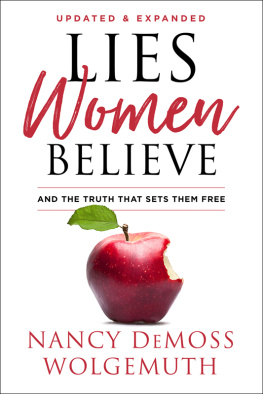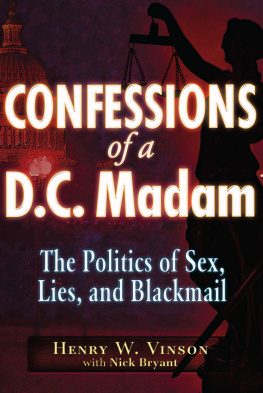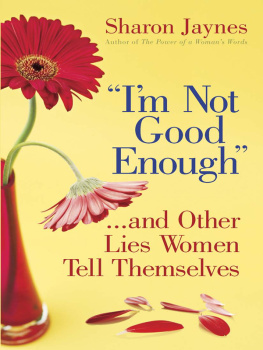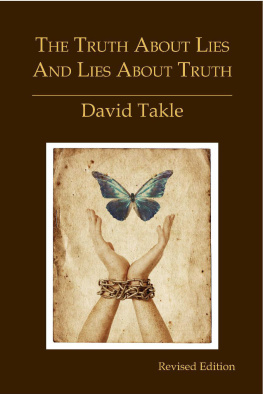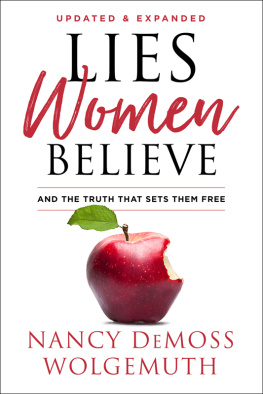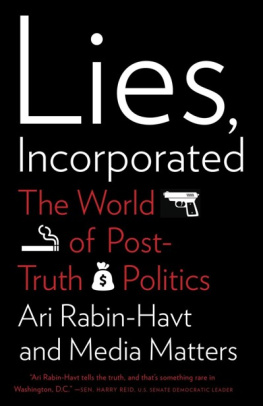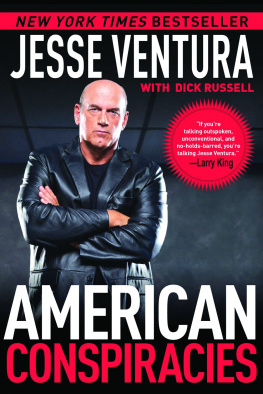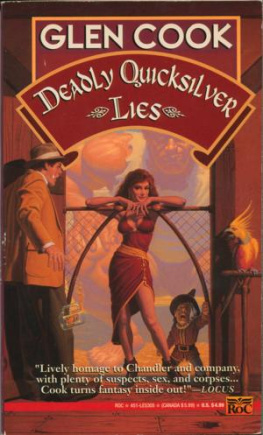THE FIFTEEN

BIGGEST LIES

IN POLITICS
ALSO BY THE AUTHORS
Common Cents
THE FIFTEEN

BIGGEST LIES

IN POLITICS
Major Garrett and
Timothy J. Penny

THE FIFTEEN BIGGEST LIES IN POLITICS. Copyright 1998 by Major Garrett and Timothy J. Penny. All rights reserved. Printed in the United States of America. No part of this book may be used or reproduced in any manner whatsoever without written permission except in the case of brief quotations embodied in critical articles or reviews. For information, address St. Martins Press, 175 Fifth Avenue, New York, N.Y. 10010.
Production Editor: David Stanford Burr
Design by Ellen R. Sasahara
Library of Congress Cataloging-in-Publication Data
Garrett, Major.
The fifteen biggest lies in politics / Major Garrett and Timothy J. Penny.1st U.S. ed.
p. cm.
ISBN 0-312-18294-5 ISBN 978-0-312-18294-6
1. Political ethicsUnited States. 2. DeceptionPolitical aspectsUnited States. 3. RhetoricPolitical aspectsUnited States. 4. JournalismPolitical aspectsUnited States. 5. United StatesPolitics and government1993- 6. United StatesEconomic policy1993- 7. United StatesSocial policy1993- I. Penny, Timothy J. II. Title.
JK468.E6G37 1998
First Edition: October 1998
1 0 9 8 7 6 5 4 3 2 1
To our fathers
MAJOR EDWARD GARRETT
AND
JAY CLAIRE PENNY
CONTENTS

ACKNOWLEDGMENTS

In our first book, Common Cents, we were derelict in neglecting to thank so many. To right this wrong we want first to thank Tims congressional staff: chiefs of staff Steve Kingsley and Steve Bosacker; press secretary Teresa McFarland and her predecessors; policy advisers Jim Haggerty, Joe Thiessen, Jane Shey, Glenda Kendrick, Mark Mullenbach, and Chris Hoven; and numerous other who helped Tim serve his constituents and his country.
As for this book, we wish first to thank our researcher, Brian Eleam, an indefatigable gatherer of facts and able adviser on the cogent use thereof. We also thank Kristin Wilson for so ably proofreading large sections of the manuscript, Mark Bentele for providing crucial advice and counsel in the books earliest stages of development, Pat McCartan for reviewing and measurably improving the abortion, religion, and corruption chapters, and Westwood Ones Jim Bohannon for his advice, counsel, and support.
A few lines of type falls well short of the gratitude we extend to our mentors, but it is the best this limited medium allows:
Major wishes to thank the teachers who made a difference: Judy Fogel, John Lester, Maria Theodore Benedict, Joan Zeno (San Diego Unified School District), Hal Lister (deceased), George Pica, and George Kennedy (University of Missouri); bosses who made a difference: Garet Von Netzer, Charles Zobel, Margaret Downing, Francis B. Coombs Jr., Josette Shiner, and Wesley Pruden; and friends who made a difference: Steve Albrecht, Randy Repaci, Chet Burchett, John St. Clair, Chris Tlapek, Jon Ralston, Warren Strobel, Mark Russell, Don Lambro, Jim Saris, Nancy Roman, Anne Veigle, and Susan Feeney.
Tim wishes thank Don Zwach and his wife Fran. Don served for eighteen years as treasurer for all of Tims campaigns and remains his closest political confidant and adviser. Also thanks to Jim Eddy, a college professor of Tims at Winona State University and always the No. 1 volunteer in Tims campaigns, and his wife, Mary; Marvel Prafke, the campaign chairman for Tims first run for public office in 1976; and Mankato State professor Dan Burton (deceased), who worked in Tims Washington office every winter and inspired and edified all whom he met, and his surviving wife, Ronnie, a dear friend and inspiration in her own right.
We wish to again thank our mothers, Kay Garrett and Donna Penny. We dedicated Common Cents to them but forgot to share their names with the world. Both of us have traveled much further in life than our roots would have suggested possible. Our success is a reflection of their love, support, and guidance.
Lastly, we thank our families: Majors wife, Julie, his daughter, Mary Ellen, and his son, Luke; Tims wife, Barbara, his sons Jamie, Joey, and Marcus, and his daughter, Molly. All have offered unflagging support and encouragement. For this and so much more we shall remain eternally grateful.
MAJOR GARRETT
TIM PENNY
THE FIFTEEN

BIGGEST LIES

IN POLITICS
INTRODUCTION

POLITICAL LIES:
A SELF-DEFENSE MANUAL
A harmful truth is better than a harmless lie.
THOMAS MANN
P OLITICIANS LIE ALL the time. Yet the word lie is rarely invoked to describe how they turn blatant untruths to their advantage. Politicians who lie are said to be disingenuous, misinformed, less than candid, unfamiliar with the truth, or at odds with reality. Rare is the politician who will publicly call another a liar.
This book is not a polemic against political lies, though we certainly wish there were fewer of them. It is an attempt to identify the most-prevalent and damaging lies in our political cultureand to reveal the truths behind them.
There is a hierarchy in the art of political lying. The most-damaging lies are those politicians tell about their ethical conduct, hoping the ugly truth never emerges. President Nixon spun such lies, lost his presidency, and undermined public confidence in all public servants. Then there are lies meant to conceal political cowardice: politicians regularly describe their positions as matters of principle when they are actually concessions to special-interest pressures. There are demagogic lies, in which politicians intentionally distort statistics or hurl sensational charges at political enemies to incite popular support for their causes. And then there are lies of decorum, in which politicians overdo the rhetoric of kindness when referring in public to political enemies they would just as soon spit on.
With the exception of the first, all of these lies play a semiuseful role in American political life. Politics would surely be better off without them, but it would be naive to discount the value many of these tactical lies have in the long and sometimes torturous pursuit of political consensus. Absolute truth is elusive in any arenaand, from a politicians point of view, not always a worthy quarry. Successful politicians know the hazards of clinging to truth in the face of popular hostility. After all, our democratic process is not about pursuit of absolute truths, but about the peaceful assembling of a consensus measured regularly at the ballot box.
Next page

